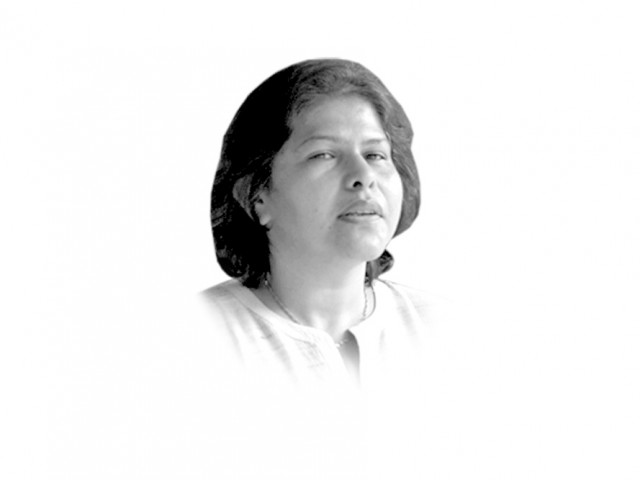Smoke and Mirrors
Clearly, colonel's intent was to micro-manage debate on Hazaras for the “sin” of being an ethnic, religious minority.

The writer is an independent social scientist and author of Military Inc.
But then marketing techniques change. I was reminded of how street beggars have changed techniques over the years. While traditional street beggars would implore you for cash, newer ones ask you to buy them food and not necessarily give them cash. The more modern types come in the form of suited-booted men and women selling the story of having their bags stolen and if you could contribute money to help them get back home. It is all about winning confidence. No wonder the ISI directorates in most cities provide patronage to beggars’ networks as a source of intelligence and raising revenue.
The disclosure of identity and claiming that his agency did not know about his participation in Hazara demonstrations was to win confidence and then guide our entire conversation in one direction. But from experience, his claim is questionable as there are spooks watching spooks and it is not possible to have a Twitter ID of liberal pretence and go around all protests, be it for Rimsha Masih or Hazaras, with the agency not knowing anything. I was reminded of my once chance meeting with one DG (Analysis) ISI at a diplomatic reception. The gent didn’t encourage conversation, which I later found out was because of not wanting to blow up his chances of promotion as Lt General.
With a ‘trojan horse’ in our middle, it was not possible to have a sensible conversation. He tried to slip in his bright idea of stopping the Shia-Sunni conflict by reducing the gap between the military and intelligentsia. It is the new fixation with psy-ops and media as a tool of war. One wondered how many people does the agency want to buy? The ISI has tremendous access to all forms of journalists, columnists, academics, print and electronic media. As if tapping phone calls was not enough, the agency has eyes glued on social media as well. A well-informed friend once told me that spooks even watch the number of likes/retweets on your Facebook and Twitter comments and the nationalities of those that do so. Thus, if there are more Indians liking your comments, you are immediately seen as an enemy of the state. Such recipe stinks of low IQ and EQ as it reflects a lack of understanding of how the internet has made the world fairly transparent. To use this method to gauge someone’s nationalism is pathetic.
How does one even begin to take an agency that only uses people seriously? The spook, who was a colonel, was dismissive of the current caretaker chief minister of Balochistan accusing him of being part of a racket to destabalise the province. This is the same as rumours being spread about the ISI paying a couple of singers these days who have recently joined a political party. Even if it is for a good deed, the mere fact that such information is being disclosed is good enough to make such characters suspicious. Perhaps, a few years later, when these singers are in responsible positions as social and political icons and happen to defy the agency, another colonel will boast of knowing them “in and out” and how they were not reliable. Maligning sometimes helps in creating the perception of an agency’s neutrality. For instance, the spook discarded Jaish-e-Muhammad’s Masood Azhar as an Indian agent, despite the agency’s continued support to the jihadi leader. This is similar to the agency bad-mouthing a journalist of being a double agent after he was kidnapped, tortured and killed in May 2011.
Clearly, the intent of the colonel was to micro-manage debate on the critical issue of the murder of innocent citizens for the “sin” of being an ethnic and religious minority. He talked about the army not being on the same page as the ISI. This is in the same vein as spreading stories about inner disconnect within the organisation — since all directorates within the organisation operate independently, the officials of each reports to their respective director-generals but not to a single person at the top, which creates confusion. Or that “I as an individual have often supported liberal values but it is the top brass the needs to change”. Such impressions smack of a smart method to present the organisation on autopilot so one could never accuse it of anything. For example, it was a couple of days after Mumbai that the army and the ISI went to confess before foreign diplomats that there were a couple of junior officers who had links with the plan and not the organisation.
Not that the ISI and the army do not disagree or that everyone in the agency has knowledge of a central plan. Lt General (retd) Shahid Aziz confirmed that the ISI was out of the information loop during Kargil. Musharraf did not want to share information with an organisation headed by General (retd) Ziauddin Butt as he was close to Nawaz Sharif. A colonel may pretend to have extensive knowledge, which in reality is limited to what he is told. His knowledge of civilian life may also be limited because the gap between civil and military understanding of each other is fairly huge and real. We certainly need a meaningful civil-military dialogue and that certainly cannot happen with “iron curtains” — gagging conversation and spreading propaganda to malign people. Such an environment compromises rather than ensures security.
Published in The Express Tribune, April 4th, 2013.















COMMENTS
Comments are moderated and generally will be posted if they are on-topic and not abusive.
For more information, please see our Comments FAQ